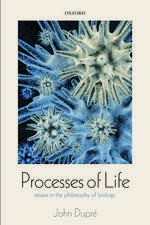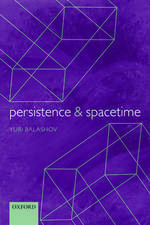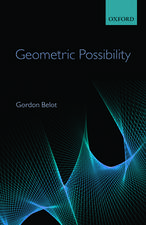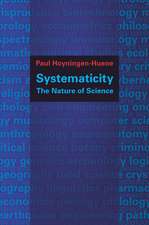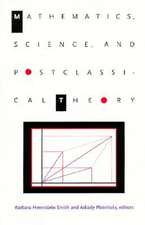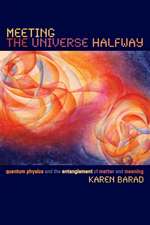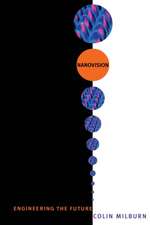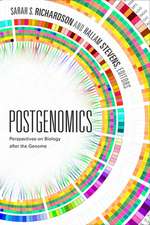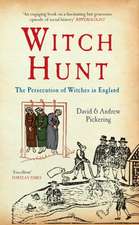The Mangle in Practice – Science, Society, and Becoming: Science and Cultural Theory
Autor Andrew Pickering, Keith Guziken Limba Engleză Paperback – 13 ian 2009
"Contributors" Lisa Asplen, Dawn Coppin, Adrian Franklin, Keith Guzik, Casper Bruun Jensen, Yiannis Koutalos, Brian Marick, Randi Markussen, Andrew Pickering, Volker Scheid, Esther-Mirjam Sent, Carol Steiner, Maxim Waldstein
Preț: 263.29 lei
Nou
Puncte Express: 395
Preț estimativ în valută:
50.38€ • 52.61$ • 41.60£
50.38€ • 52.61$ • 41.60£
Carte tipărită la comandă
Livrare economică 15-29 aprilie
Preluare comenzi: 021 569.72.76
Specificații
ISBN-13: 9780822343738
ISBN-10: 0822343738
Pagini: 320
Ilustrații: 3 illustrations
Dimensiuni: 152 x 227 x 26 mm
Greutate: 0.43 kg
Editura: MD – Duke University Press
Seria Science and Cultural Theory
ISBN-10: 0822343738
Pagini: 320
Ilustrații: 3 illustrations
Dimensiuni: 152 x 227 x 26 mm
Greutate: 0.43 kg
Editura: MD – Duke University Press
Seria Science and Cultural Theory
Cuprins
Introduction/Andrew Pickering; New Ontologies/Andrew PickeringI: STUDIESA Choreography of Fire: A Posthumanist Account of Australians and Eucalypts / Adrian Franklin; Crate and Mangle: Questions of Agency in Confinement Livestock Facilities / Dawn Coppin; Soul Collectors: A Meditation on Arresting Domestic Violence / Keith Guzik; Resisting and Accommodating Thomas Sargent: Putting Rational Expectations Economics through the Mangle of Practice / Esther-Mirjam Sent; The Mangle of Practice and the Practice of Chinese Medicine: A Case Study from 19th Century China / Volker Scheid; Mårup Church and the Politics of Hybridisation: On Choice, Becoming, and Choosing to Become / Casper Bruun Jensen ߢRandi MarkussenII: REFLEXIVITYActing in an Open-Ended World: Nature, Culture, and Becoming in Environmental Management / Lisa Asplen; A Manglish Way of Working: Agile Software Development / Brian Marick; The Docile Body of the Scientist / Yiannis KoutalosIII: THEORYThe Mangle of Practice or the Empire of Signs: Toward a Dialogue between Science Studies and Soviet Semiotics / Maxim Waldstein; Ontological Dance: A Dialogue between Heidegger and Pickering / Carol SteinerContributors; Index
Recenzii
Andrew Pickering is a major figure in the field of science studies. In the original, widely cited and widely admired but still controversial Mangle of Practice, he developed a number of important concepts that are strongly resonant for many members of the current generation of scholars, researchers, and theorists in the social sciences and humanities. This new very substantial, highly readable collection will be illuminating for readers interested in science studies, post-humanist approaches to ethical-pragmatic issues, and/or new directions in ontology.Barbara Herrnstein Smith, author of Scandalous Knowledge: Science, Truth, and the HumanAndrew Pickerings mangle of practice is one of the key contemporary interpretive frameworks that question the society/nature dichotomy. His proposal makes distinct contributions not only to science studies but to all disciplines engaged in posthumanist projects of knowledge production and committed to bypassing the sterile dichotomy between rationality and relativism. Applying Pickerings mangle to problems ranging from natural resource management to the dynamics of police work, this timely collection demonstrates the power and flexibility of Pickerings proposal.Mario Biagioli, author of Galileos Instruments of Credit: Telescopes, Images, SecrecyThis excellent collection offers cutting-edge theorizations of cultural practice, showing how science and society work with and against each other across a broad cultural landscape. It is especially welcome that the essays explore, often profoundly, a number of phenomenapracticeswhich have rarely if ever been addressed previously, but which are shown here to possess unexpected complexity and significance.Arkady Plotnitsky, author of Complementarity: Anti-Epistemology after Bohr and Derrida
Notă biografică
Textul de pe ultima copertă
"Andrew Pickering is a major figure in the field of science studies. In the original, widely cited and widely admired but still controversial "The Mangle of Practice," he developed a number of important concepts that are strongly resonant for many members of the current generation of scholars, researchers, and theorists in the social sciences and humanities. This new, very substantial, highly readable collection will be illuminating for readers interested in science studies, post-humanist approaches to ethical-pragmatic issues, and/or new directions in ontology."--Barbara Herrnstein Smith, author of "Scandalous Knowledge: Science, Truth, and the Human
"
"
Descriere
Pickering's mangle theory and its applicability beyond the limited cases he presented in the seminal book that introduced this theory



















